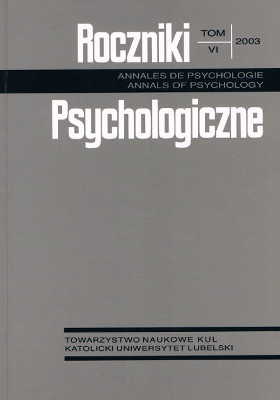Temporal competence – the method of measurement
Abstract
Temporal competence are manifested in having knowledge about one's own past, presence, and future, and making use of its resources in coping with concrete circumstances. For this kind of competence, a factor tool of measurement has been worked out by the authors – a Questionnaire of Temporal Competence. The method consists of 64 items. in the result of the test six indicators are used: Life Openness, Sense of Life, Prospective Approach, Future Acceptance, Presence Acceptance, and a general indicator. The reliability of the method has been established in a group of 612 respondents – it is high. Diagnostic accuracy has been tested on the basis of 212 respondents tested by the following methods: W. Lens's Questionnaire of Future Temporal Perspective, E. L. Shostrom's Temporal Competence Scale, C. S. Nosal's and B. Bajcar's Questionnaire of Temporal Orientation AION-99, and A. Antonowski's Questionnaire of the Sense of Coherence SOC-29.
References
Bajcar, B. (2000). Wielowymiarowość osobistych koncepcji czasu. Roczniki Psychologiczne, 3, 71-93.
Chlewiński, Z. (1977). Czas w aspekcie fizjologicznym i psychologicznym. Roczniki Filozoficzne, 25, 3, 93-117.
Chomsky, N. (1975). Reflections on language. New York: Pantheon Books.
Couch, L., Adams, J. M., Johnes, W. H. (1996). The assessment of trust orientation. Journal of Personality Assessment, 67(2), 305-323.
Damasio, A. R. (2002). Pamięć czasu. Świat Nauki, 11(135), 48-55.
Goleman, D. (1999). Inteligencja empocjonalna w praktyce. Poznań: Media Rodzina.
Hoornaert, J. (1973). Time perspective theoretical and methodological considerations. Psychologica Belgica, 3, 44-61.
Ingarden, R. (1975). Książeczka o człowieku. Kraków: Wydawnictwo Literackie.
Januszewski, A. (2002). Opis skal Kwestionariusza Poczucia Koherencji (SOC-29) A. Antonovskiego (mps, Katedra Psychologii Ogólnej KUL).
Lens, W. (1994). Odraczanie nagrody, samokontrola a przyszłościowa perspektywa czasowa. W: A. Januszewski, P. Oleś, T. Witkowski (red.), Wykłady z psychologii w KUL (t. 7). Lublin: RW KUL, s. 297-308.
Łukaszewski, W. (1983). Orientacje temporalne jako jeden z aspektów osobowości. W: W. Łukaszewski (red.), Osobowość – orientacje temporalne – ustosunkowanie się do zmian. Wrocław: Wyd. Uniwesytetu Wrocławskiego, s. 5-40.
McClelland, D. (1973). Testing for competence rather than for „intelligence”. American Psychologist, 28, 1-14.
Nawrat, R. (1981). Orientacja temporalna. Przegląd technik pomiaru i wyników badań. Przegląd Psychologiczny, 24, 1, 97-123.
Nosal, C. S., Bajcar, B. (1999). Kwestionariusz Orientacji Temporalnej AION-99. Podręcznik metody (mps).
Nosal, C. S., Oleś, P. (1994). Diagnostyczna wartość pomiaru orientacji temporalnych dla wskaźników kryzysu wartościowania. Przegląd Psychologiczny, 37, 4, 525-537.
Pastuszka, J. (1967). Człowiek i czas. Refleksje psychologiczne. Roczniki Filozoficzne, 15, 4, 6-23.
Raven, J. (1984). Competence in modern society. London: Lewis & Co. Ltd.
Santor, D. A., Zuroff, D. C. (1994). Depressive symptoms: Effects of negative affectivity and failing to accept the past. Journal of Personality Assessment, 63(2), 294-312.
Shostrom, E. L. (1972). Freedom to be. New York: Bantam Books Inc.
Snyder, C. R., Sympson, S. C., Ybasco, F. C., Borders, T. F., Babyak, M. A., Higgins, R. L. (1996). Development and validation of the State Hope Scale. Journal of Personality and Social Psychology, 70, 2, 321-335.
Sobol, M. (2000). Teraźniejszość jako preferowana orientacja temporalna a poczucie satysfakcji z życia (mps pracy magisterskiej, KUL).
Szewczyk, W., Uchnast, Z. (1978). Metoda pomiaru samoaktualizacji E. L. Shostroma. Zagadnienia Wychowawcze a Zdrowie Psychiczne, 1, 28-44.
Waterhouse, J., Minors, D., Waterhouse, M. (1998). Twój zegar biologiczny. Jak żyć z nim w zgodzie? Warszawa: Ksążka i Wiedza.
White, R. W. (1959). Motivation reconsidered: The concept of competence. Psychological Review, 66, 297-333.
Zaleski, Z. (1988). Transtemporalne „ja”: osobowość w trzech wymiarach czasowych. Przegląd Psychologiczny, 31, 4, 931-945.
Zaleski, Z. (1991). Psychologia zachowań celowych. Warszawa: PWN.
Copyright (c) 2003 Roczniki Psychologiczne

This work is licensed under a Creative Commons Attribution-NonCommercial-NoDerivatives 4.0 International License.


